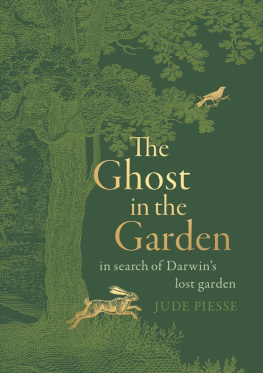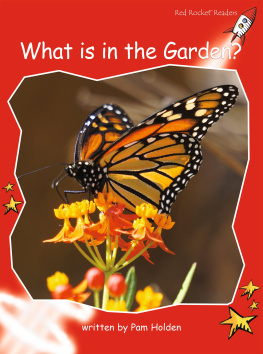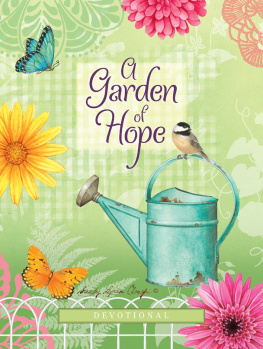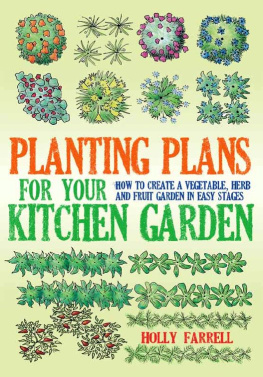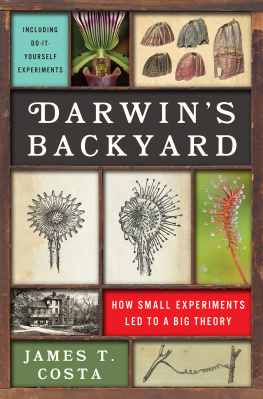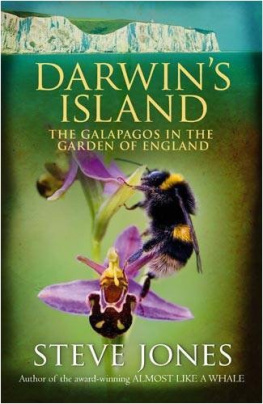
The Ghost in the Garden
Jude Piesse is an academic and writer. She holds an MA in Creative Writing from the University of East Anglia and a PhD in English Literature from the University of Exeter. She has published widely on nineteenth-century literature and culture, including her book about emigration literature, British Settler Emigration in Print, 18321877 (OUP, 2016). Though she grew up in Shropshire, she did not discover Darwins childhood garden until she moved to Shrewsbury with her young family to take up her first lectureship. She now works as a lecturer in English Literature at Liverpool John Moores University.
Scribe Publications
2 John Street, Clerkenwell, London WC1N 2ES, United Kingdom
1820 Edward St, Brunswick, Victoria 3056, Australia
3754 Pleasant Ave, Suite 100, Minneapolis, Minnesota 55409, USA
Published by Scribe 2021
Copyright Jude Piesse 2021
All rights reserved. Without limiting the rights under copyright reserved above, no part of this publication may be reproduced, stored in or introduced into a retrieval system, or transmitted, in any form or by any means (electronic, mechanical, photocopying, recording or otherwise) without the prior written permission of the publishers and the author of this book.
The moral rights of the author have been asserted.
9781913348052 (UK edition)
9781925849943 (Australian edition)
9781950354764 (US edition)
9781925938876 (ebook)
Catalogue records for this book are available from the National Library of Australia and the British Library.
scribepublications.co.uk
scribepublications.com.au
scribepublications.com
For my daughters, with love
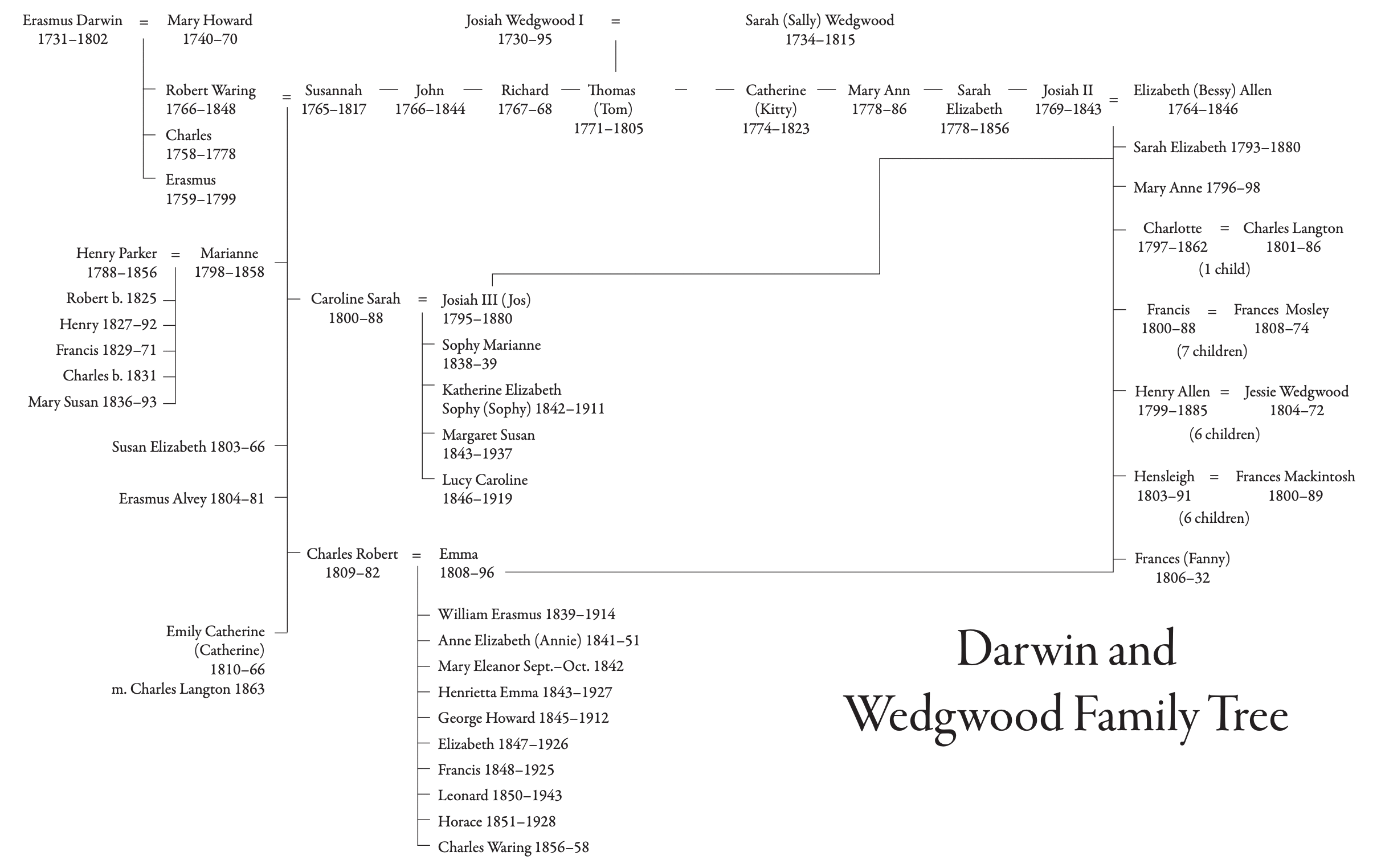
CONTENTS
Lorum
I often think of the Garden at home as a Paradise;
on a fine summers evening, when the birds are singing
how I should enjoy to appear, like a Ghost amongst you,
whilst working with the flowers.
CHARLES DARWIN TO CAROLINE DARWIN,
20 SEPTEMBER 1833, BUENOS AIRES.
Darwin never stopped thinking about the garden at home. The garden at The Mount in Shrewsbury was with him from the very beginning, when, as a boy, he first examined flowers, and collected birds eggs, and fished in the River Severn. It remained in his thoughts when he wrote to his elder sister Caroline in 1833 during his Beagle expeditions: a little patch of Shropshire ground that swelled to the proportions of a lost paradise.
The garden was there again in 1842, a green glint visible through the windows as Darwin completed his first written outline of evolutionary theory during a visit to his childhood home. And it must have been on his mind during the years when he built a new garden on old plans at Down House in Kent and eventually wrote the Origin .
If a place can be said to follow a man, then the garden at The Mount followed Darwin to the last. It forms the native terrain of the born naturalist who is the Romantic gatekeeper of Darwins autobiographical projects the boy gardener who collects pebbles, and climbs trees, and invents great falsehoods about being able to change the colour of crocuses. Even the soberer Darwin of old age, who wrote as if he were already a dead man in another world looking back at my own life, chose to return to his earliest haunt.
It was in the Garden at home that Darwin gleaned some of his most foundational insights. The sense of wonder in the natural world that would eventually grow stronger than fear, and the practical knowledge that real, tangible, often ordinary, details must always precede abstraction. The intuition that every one of those details, however apparently distinct, must necessarily be connected to every other: from the flattened and fringed legs of the water-beetle to the beautifully plumed seed of the dandelion. Evolution may have taken wing where the hemispheres meet, but it was born in a Shropshire hedge.
It was also at The Mount that Darwin first learnt that even the naturalists pursuit of truth must be held in check by deeper moral feeling. Only a single egg should be taken from the nest, Caroline explained: curiosity alone will not suffice a boy must learn to be humane.
Caroline was not alone in wielding a lasting influence on Darwin through informal garden lessons. Their mother, Susannah, is said to have helped design the layout of the gardens in which she bred doves in the early 1800s before her premature death, setting overlooked precedents for both her sons botanical enthusiasm and the crucial understanding of variation and inheritance in pigeons that underpins so much of the Origin . Susan, the most charismatic and outspoken of Darwins four sisters, posted mixed bulletins of gardening news, local gossip, and editorial advice in reply to the journal instalments Darwin sent home from his post as ships naturalist on the Beagle instalments that, as the published Voyage of the Beagle , register surprising traces of Shropshire life. The devoted, maternal Caroline added updates on the progressive new infant school she had founded opposite The Mount in continuation of her work as Darwins first instructress, along with poignant pleas for her charge to come home. And when Darwin did finally come home to settled ways of life, soon falling into a pattern of shire visits that anticipated his move to the Kent countryside, it fell to the young Mount gardener, John Abberley, beekeeper and bean tender, to help with a series of mysterious new experiments. He was one in a long line of green-fingered labourers who helped to carry the greatest theory of their age.
The stories of The Mounts less famous gardeners the mother, sisters, and workers lost in the background of most traditional Darwin biographies are inseparably connected with Darwins own. Uplifting, tragic, revelatory, and frustratingly opaque, each story is also a vital strand in the gardens larger plot and the story of a place is always bigger than that of an individual. The garden bears the imprints of all the lives it has known. The squat boot-prints of poor gardeners as well as the narrow trails of ladies. The tracks and root spread of countless wild residents. The soil-deep memories of environmental changes still shaping the common ground below.
This is the kind of story that I believe fits Darwin best, precisely because it makes him less of the protagonist he never sought to be. Though it has only ever been a patch of Shropshire ground, one now forgotten and neglected, the garden has the power to reveal not only the roots of Darwins collaborative, domestic methodologies, but a localised section of the complex and radiating lines that bind all things together: that inextricable web first glimpsed within its range.
Darwins childhood garden is not just Darwins after all. It is a tangle of experiences that both shaped and exceeded him; a hatchway of intercrossing pathways both man-made and natural that lead into the future and back to the past.
*
Now, just as it once haunted Darwin, the garden is unexpectedly haunting me too.
I discovered it on my doorstep in 2015, when I returned to Shropshire after an absence of twelve years. I had been offered my first lectureship at a new university centre in Shrewsbury, close to the town in which I grew up and where my mother still lives, and just around the corner from my sister.
My elder daughter, Hazel, had been born shortly after Id completed my doctorate at the University of Exeter in 2013. Since shed turned six months, and with my PhD scholarship at an end, I had been working insecure and poorly paid sessional university teaching contracts while finishing my monograph about nineteenth-century emigration literature and the Victorian novel. I had also been mentally preparing for the move that I knew would have to come if I was to get a more stable foothold in the cut-throat academic job market that seemed much more accommodating to thrusting young men from Oxford than women in their thirties with toddlers in tow. I hadnt expected the job to crop up back home in Shropshire because, though I had ended up moving back twice since originally leaving at eighteen, and though I missed living close to my family, I was of the persuasion that nothing ever cropped up in Shropshire. That was one of the reasons Id had to move away.
Next page
